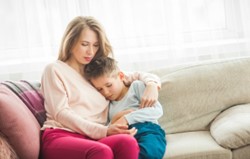How might my child respond to a death?
Children and young people experience the same feelings as adults after a bereavement or loss. They have a similar need for support, but they may not be able to express their feelings in words. Children often show their feelings in how they behave rather than what they say.

You might see that your child:
- jumps in and out of sadness - they could be distressed one minute and then happily playing the next
- shows anger and/or behaviour that you might expect of a younger child
- uses pretend play to try and make sense of what happened
- has difficulty sleeping, such as bad dreams and fear of the dark
- is clingier than usual and does not want to be left alone. This could be linked to fears for their own safety or the safety of friends or family
- has become focused on the death and shows fear of dying
- has difficulty concentrating (for example, in school)
- becomes very aware of danger, including sensitivity to loud noises
- is not as interested in food
How can I talk to my child about the death of a loved one?
Children grieve, even at a very young age. You might feel that you are protecting your children by not talking to them about a serious illness or death; however this can make them feel confused and excluded. If you are worried about saying the wrong thing the following tips might help.
Explain what has happened
Try to talk to your child honestly and explain what has happened in a way that they can understand. It's clearer to say someone has died rather than the person has ‘gone to sleep’ or ‘gone away’. This may be confusing for your child, or might make them frightened to go to sleep or worry that you might go away and not come back.
Encourage questions
Children will often ask the same questions over and over, which can be distressing. It's part of their need for reassurance and can help them process information. When they ask a question, you could start by asking "what do you think?" You can then build your answer on their understanding of what happened.
Listen to how your child is feeling
Allow your child to have the chance to express their feelings and thoughts about the death. Try to avoid telling your child not to worry or be sad. Explain that everyone responds to death in different ways and that it's ok to be sad, angry, confused, guilty, or anxious. Your child may need more time to absorb what has happened if they do not feel sad.

Reassure
Give your child plenty reassurance. Let them know they're still loved and that there are people there to care for them. Or you may need to reassure them that they're not to blame for what happened. Being naughty does not make someone die, nor do wishes or thoughts.
Should my child go to the funeral?
You should include your child in any decisions about how they would like to say goodbye. Explain what would happen at the funeral and let them know that funerals can be a good way to say goodbye.
How can I help my child remember?
It might help to make a memory box. You can include photographs or objects that remind your child of their loved one. They may want to write a poem or a letter, or do a drawing. It can be helpful to think of some happy memories and favourite stories to write down and put in the box.
Be honest about your feelings
Children easily pick up on tension, distress or anxiety in adults. If they do not know why, it can be very confusing. It can be helpful to share feelings and explain that it's natural to cry or feel upset, even for adults. If you're feeling completely overwhelmed, be kind to yourself and take some time and space to process your emotions before speaking to your child.
Should I keep routines the same?
Yes - keeping routines and boundaries the same can help your child feel secure. Continue to support them to do the things they enjoy - it's important to still have fun even while you're grieving. Keeping those connections you have with people in the community can really help as grieving can feel very isolating.
Should I get support for myself?
As a parent or carer, it can feel scary to be vulnerable in front of others. Exploring your feelings with those you trust is an important part of the recovery process. Sharing memories and your sense of loss can strengthen old and create new friendships.
Returning to school after someone dies
There are no set policies that say how much time off school or college bereaved children or teenagers can take. However, keeping normal routines is important and taking too much time off could make it harder for them to manage. You may want to consider the following:
- Get in touch with the school as soon as you can so that they're aware of the bereavement. They may help you identify a member of staff who can be available if your child needs to talk to someone.
- Let school staff know how you have explained the death to your child. Create a joint script so that both you and school staff are giving the same message if your child asks questions.
- Ask your child what they'd like you to tell the school so they feel involved and have a say. This is especially important with older children.
- If your child is finding it hard to go to school, consider giving them an object to remember you and give them comfort and reassurance. If they are older, make a plan to stay in contact with you at breaks and lunchtimes.
Further support
- Childhood Bereavement UK
- Childhood Bereavement UK brings together guidance and information to help support you at this difficult time.
- Call 0800 028 8840
- Cruse Bereavement Care
- Bereaved people may have to deal with increased trauma and may be cut-off from some of their usual support network. Those who are already struggling with bereavement, or whose relatives or friends die through other causes will also be affected.
- Call 0808 808 1677

